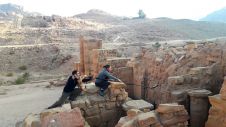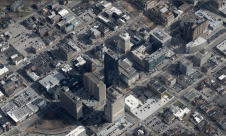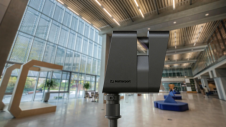For Asians, By Asians and With Asians
25 Years Asian Conference on Remote Sensing
The first Asian Conference on Remote Sensing (ACRS), a conference for Asians, by Asians and with Asians, was held in Bangkok in December 1980. The 27th ACRS is scheduled to take place in Ulaanbaatar, Mongolia in autumn 2006. Where did ACRS come from and where, after more than 25 years, is it going? As the general secretary who has organised ACRS uninterruptedly since 1980, the author reflects on its process of maturation.
This article is a modified version of a paper published in the Japanese Journal of Survey, March, 2005, pp. 26-28.
The start: Costa Rica, April 1980. Many participants from Asia joined the ERIM International Symposium on Remote Sensing of Environment. Although Costa Rica is far from Asia and the airfare at that time was sky-high (about US$6,000), many people from China, China Taipei, the Philippines, Thailand, Sri Lanka, and others, participated in the conference. One evening in Costa Rica I invited about twenty Asian friends to my hotel room for a ‘Yakitori’ (chicken barbecue) party with ‘sake’. After few but enough drinks, my Thai friend Manu suddenly asked the assembled company: “Why do we have to go all the way to Costa Rica?” Then he provided his own answer: “It is because we don’t have our own conference in Asia, and that’s all due to Japan. That country always looks at Western countries but never at Asia. Hey you, Shunji Murai, you are from Japan; can you organise our own conference for Asians, by Asians and with Asians within this year? The Thai people will be pleased to act as host in Bangkok.” Because I too had drunk enough, I answered yes.
Some Highlights
Organising the first ACRS was not easy, but with 144 participants it was rewarding. All expenses were covered by contributions from Japanese colleagues, including the Japan Association of Remote Sensing (JARS). We were so lucky to hold the first ACRS in Thailand because there we found a good tradition to dance, sing and joke at the welcoming party. China was willing to host the second ACRS: an exciting conference. All Chinese participants were dressed in ‘People’s cloth’. Delegates from eight countries spent three nights drafting the Statutes of the Asian Association on Remote Sensing (AARS). No position of ‘president’ was created because that term could cause seniority problems within Asia, so I was appointed as general secretary, a position I have held uninterruptedly up until today. I will not mention all twenty-five ACRSs held since 1981; Table 1 gives an overview of their year and venue. Instead I will remember the most exciting ones.
The third ACRS held in Bangladesh, at which Dr Pramanik and Dr Chaudri were so active, was very impressive because of its venue in a less developed country. The fourth ACRS was held in Sri Lanka under the leadership of Mr Christy Nanayakkara, director of the survey department, although Colombo was under martial law. During the fifth ACRS, under the enthusiastic guidance of Mr Malla, His Majesty the King of Nepal chaired the opening ceremony. The sixth ACRS was held in India, where Prof. Deekshatulu was a strong leader. During the ninth ACRS Her Royal Highness Maha Chakri Sirindhorn presented a multi-vision keynote speech on “Culture, History and Remote Sensing in Thailand”. The 13th ACRS held in Ulaanbaatar in Mongolia in 1992 was most impressive; Princess Sirindhorn visited Mongolia, joined our welcoming party and took part in a Thai dance, escorted by a Minister of the Mongolian Government! This was something that would have been impossible in Thailand. During the 16th ACRS held in Thailand, Thai remote-sensing scientists established ‘Dr. Boon’s Gold Medal’, to be awarded to those who have contributed to the growth of remote sensing in Asia. I am honoured to have received this medal together with Dr Kaew, awarded by HRH the Princess Sirindhorn. The 20th ACRS was remarkable because it was held in a Hong Kong newly returned to China by the United Kingdom.
Silver Jubilee
The 25th ACRS, with 801 participants from 41 countries, both Asian and Western, was the biggest ACRS conference ever. The silver jubilee was celebrated in Chiang Mai, Thailand’s most cultural city, in November 2004 during the week of Thai festival ‘Loi Kratong’ (lantern festival). HRH Maha Chakri Sirindhorn graciously chaired the opening ceremony. The General Conference of AARS approved new ordinary membership for five countries: Bhutan, Cambodia, Syria, Saudi Arabia and Russia, making 28 ordinary members in all. Why Russia? The Statutes of AARS state that “any Asian country or region including a near-Asian country interested in remote sensing may apply to join the association as an ordinary member”. That is why Australia and Russia as near-Asian countries were welcomed to AARS; indeed, we Asians are very flex-ible and understand the multi-cultural nature of our neighbours.
Beyond Expectations
One of my American friends said to me after the first conference: “It is impossible to continue this kind of conference in Asia: two or three times will be the maximum because not many people show interest in remote sensing in Asia. Don’t waste your energy!” Several Japanese friends also asked me, “How will Japan benefit from your organising ACRS in Asia?” Beyond the expectations of my friends, the ACRS is still alive after 25 years and expanding activities year by year.
Until the ACRS matured the general secretary prepared almost all the administrative work, including call for papers, selection of papers, and compiling the final programme. However, after twenty years the general secretary has entrusted all matters to the host country, adopting the philosophy of friendship first and money after and explaining the origin of for Asians, by Asians and with Asians. I would say that my major work was done, except for watch-ing ACRS grow just as a grand-father watches his grandson.
Achievements
During the 25 years of its existence ACRS has achieved the following:
- creating confidence among Asians that they are able to organise a self-supporting remote-sensing conference for Asians, by Asians and with Asians
- establishing a gateway for young remote-sensing scientists to stimulate each other in creative thinking; the cheap registration fee of US$100 enables many Asians from developing countries to participate
- establishing networks among key scientists in Asia for communication and co-operation; the philosophy of friendship first and money after has greatly help-ed
- keeping a unique Asian style, different from the Western approach, but which is also appreciated by Westerners
- enabling Japanese scientists to communicate with other Asian scientists and understand what problems exist within Asia and might be reflected in their research.
Concluding Remarks
We acknowledge all Asian remote-sensing scientists and many friends from Western countries who have shaped and supported the ACRS confer-ences without commercialisation. The ACRS will survive for many years so long as Asia keeps in mind the original spirit. I don’t know how long I will continue to be general secretary, but I will try to preserve this twenty-five-year-young tree and watch how it becomes a big tree.

Value staying current with geomatics?
Stay on the map with our expertly curated newsletters.
We provide educational insights, industry updates, and inspiring stories to help you learn, grow, and reach your full potential in your field. Don't miss out - subscribe today and ensure you're always informed, educated, and inspired.
Choose your newsletter(s)
























